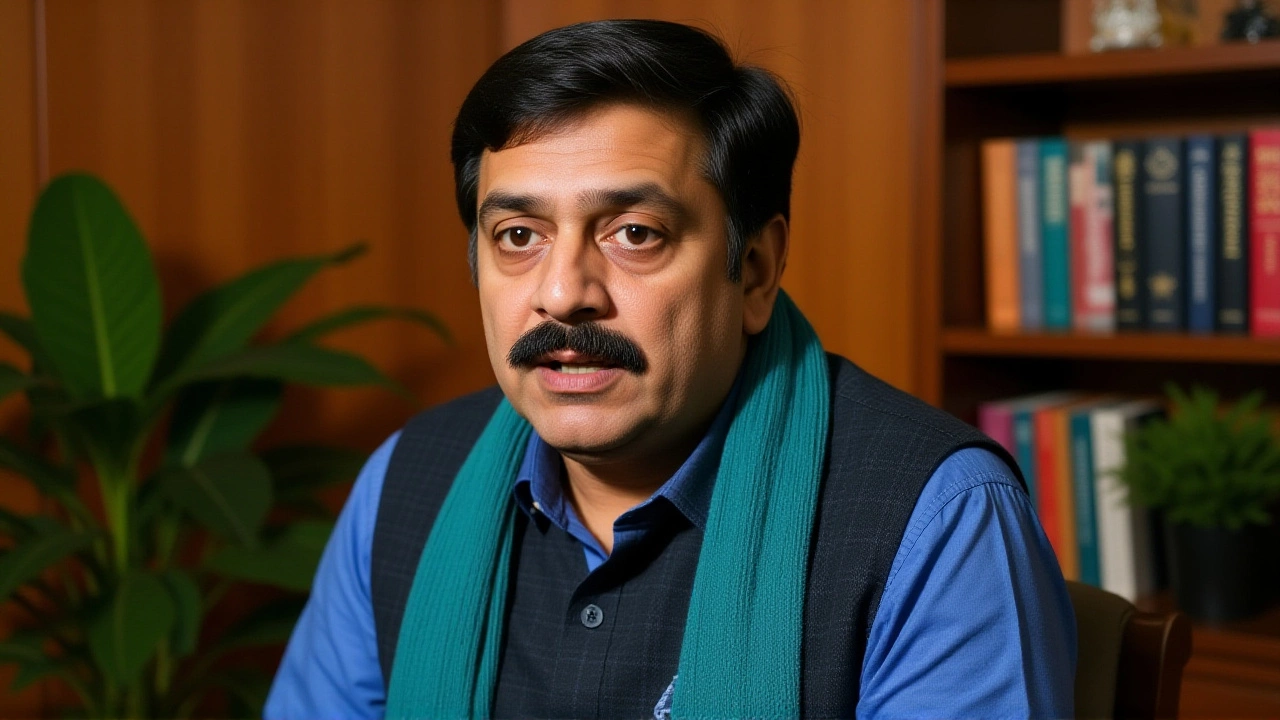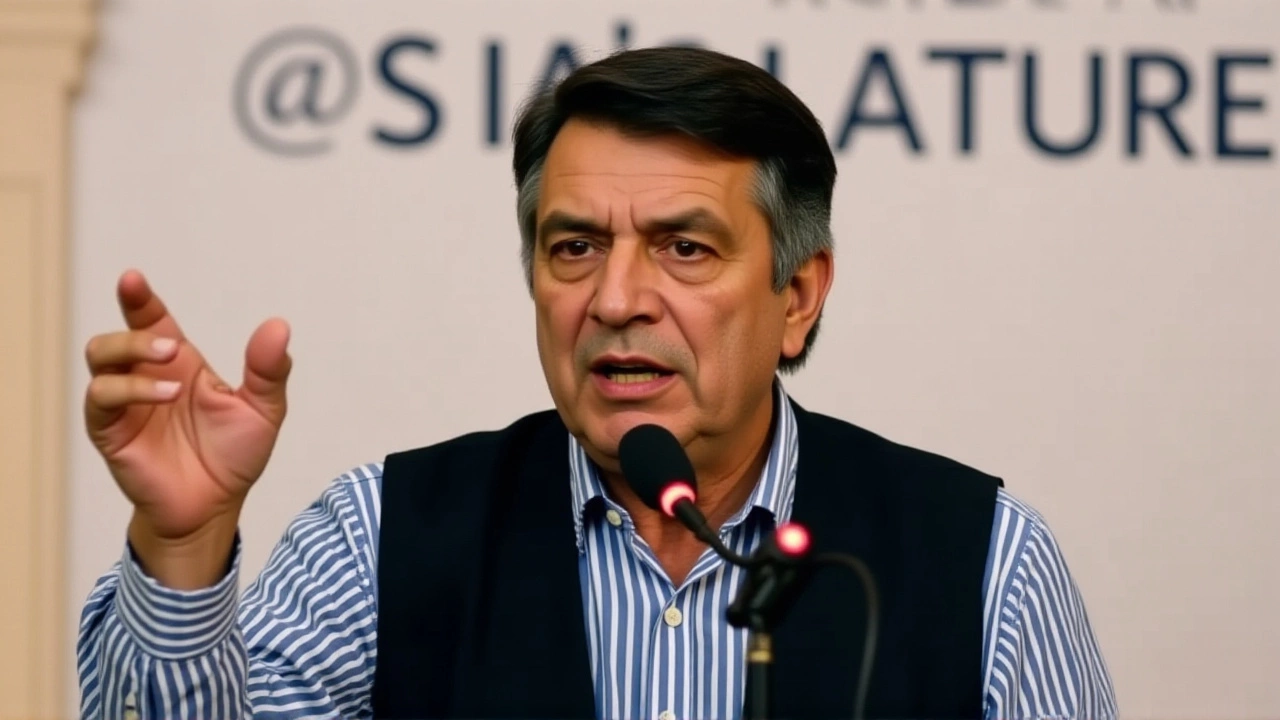When Shashi Tharoor, Member of Parliament for Thiruvananthapuram, stepped onto the PTI show @ 4 Parliament Street on May 9, 2024, the political climate in Delhi shifted in a subtle but telling way. In the same interview, Congress president Mallikarjun Kharge later warned his colleagues that mimicking Tharoor’s elaborate English could become a liability – a comment that sparked a flurry of reactions across party ranks and social media.
Why language matters in Indian politics
India’s multilingual tapestry has always made language a flashpoint in elections. Hindi‑speaking states often hear campaign slogans in Hindi, while the south leans on regional tongues. English, meanwhile, is the lingua‑ franca of the elite, the bureaucracy, and increasingly, the digital sphere. Tharoor, with his prolific bibliography of 26 books – most recently A Wonderland of Words in 101 Essays – has turned his command of English into a personal brand. That brand, however, sits uneasily with a party that still grapples with translating its promises for a largely non‑English‑speaking electorate.
The PTI interview and Kharge’s caution
During the @ 4 Parliament Street interview, Tharoor spoke about the “privilege” of expressing ideas across “different fields of activity” and emphasized how writing has become “the easiest way to reach people” in the digital age. The conversation quickly turned to the 2024 Lok Sabha elections, with Tharoor outlining a Congress strategy that leans on an “INDIA Bloc” coalition.
Days later, when PTI asked Kharge about Tharoor’s recent op‑ed in The Hindu, the party chief replied, “I can’t read English, but his language is very good – that’s why we made him a member of the working committee. But we all need to be relatable to the common man.” The subtext was clear: while Tharoor’s eloquence draws headlines abroad, it may alienate voters who feel left out of the linguistic elite.
Social‑media sparring: the bird metaphor
Tharoor’s cryptic May‑2024 Instagram post – a lone bird against a clear sky with the caption, “Don’t ask permission to fly. The wings are yours. And the sky belongs to no one…” – was intended as a metaphor for individual freedom. It didn’t sit well with some in the party. Fellow MP Manickam Tagore retorted with his own image, warning that “even a free bird must watch the skies—hawks, vultures, and ‘eagles’ are always hunting.” The exchange underscored an intra‑party tension: the push‑and‑pull between lofty rhetoric and ground‑level political realities.
Election battleground: Thiruvananthapuram’s three‑way fight
Tharoor is eyeing a fourth term in his home constituency of Thiruvananthapuram, Kerala, facing candidates from the Bharatiya Janata Party (BJP) and the Communist Party of India (CPI). The Lok Sabha election, officially launched on April 26, 2024, has turned the city into a micro‑cosm of the national contest: development narratives clash with identity politics, and language rhetoric becomes another front line.
Local voters cited infrastructure promises, but they also listened for the “plain” language that could cut through political jargon. In a rally on May 7, Tharoor’s speech was peppered with the sort of sesquipedalian flourishes that have earned him both admiration and criticism. “We must not be shackled by the past, but we must also understand the tools left to us,” he said, echoing his earlier defense that English, “a colonial legacy, is as useful as railways or telegraphs.”

Tharoor vs. Modi: a clash of rhetoric
Amid the campaign, Tharoor launched a sharp rebuke of Prime Minister Narendra Modi’s recent remarks on “wealth redistribution,” labeling them “blatantly communal” and “polarising.” He argued that the Prime Minister, as head of a secular nation, should avoid language that pits religious groups against each other. The comment resonated with some urban voters but fed directly into Kharge’s warning: rhetorical flair can backfire if it’s perceived as out of touch.
Later, on May 10, Tharoor joined an all‑party delegation to the United States, addressing the Indian Consulate in New York City about India’s response to the Pahalgam terror attack that claimed 26 lives. When asked about his role, he quipped, “I don’t work for the government,” a line that underscored his dual identity as a parliamentarian and a global diplomat. The statement was covered extensively in Indian media, adding another layer to the language‑politics debate.
Implications for Congress and the broader political discourse
Kharge’s caution may seem like a footnote, but it signals a deeper strategic dilemma for the Congress party. The organisation is trying to balance a modern, cosmopolitan image with grassroots accessibility. While leaders like Tharoor attract attention on the world stage, the party’s electoral calculus must factor in whether that attention translates into votes.
Analysts suggest that Congress could adopt a two‑track communication strategy: keep Tharoor’s eloquence for national and international forums, while deploying region‑specific spokespeople who converse in Malayalam or Hindi for local rallies. The idea isn’t new – parties have long used “regional faces” to bridge linguistic gaps – but the current episode has put the tension under a microscope.
For voters, the debate may feel abstract, yet it ties directly to how policies are explained. A promise of “jobs” or “healthcare” means little if it’s couched in words that don’t resonate. As Tharoor himself once said, “English is the language that brings these various threads of my India together,” but the same thread can fray if it doesn’t reach every ear.
What lies ahead?
The Lok Sabha results are slated for June 4, 2024. If Tharoor wins, the party will need to reconcile his international standing with domestic expectations. If he loses, Kharge’s warning may be retrospectively framed as prescient counsel that could have saved the party from over‑relying on high‑flown rhetoric.
Either way, the episode highlights a timeless truth in Indian politics: words matter, but they matter most when they are understood.
Frequently Asked Questions
How does Kharge’s comment affect Congress’s campaign strategy?
Kharge’s remark signals a shift toward simpler, locally resonant messaging. Analysts expect the party to deploy more Malayalam‑speaking spokespeople in Kerala while keeping Tharoor’s articulate presence for national media, aiming to bridge the gap between elite appeal and grassroots connection.
What was the core criticism Tharoor leveled at Prime Minister Modi?
Tharoor called Modi’s comments on wealth redistribution “blatantly communal” and “polarising,” arguing that a Prime Minister should address the nation without framing policies in religious terms, especially ahead of a tightly contested election.
Why did Tharoor’s bird‑image post stir controversy?
The post, meant as a metaphor for personal freedom, was interpreted by some party insiders as a veiled critique of intra‑party dynamics. MP Manickam Tagore’s counter‑post highlighted concerns that political opponents could exploit such symbolic language, turning the exchange into a subtle power play.
What role does language play in the Lok Sabha elections?
Language shapes voter perception, especially in a nation where half the electorate may not be comfortable with English. Candidates who communicate in regional languages often outperform those whose messages are densely English‑laden, making linguistic accessibility a decisive factor in the 2024 contest.
What impact could Tharoor’s U.S. delegation visit have on his campaign?
Speaking at the Indian Consulate in New York bolstered Tharoor’s image as a global diplomat, appealing to urban, internationally minded voters. However, critics argue that it may reinforce the narrative that he is out of touch with local concerns, a paradox that the Congress must manage.
